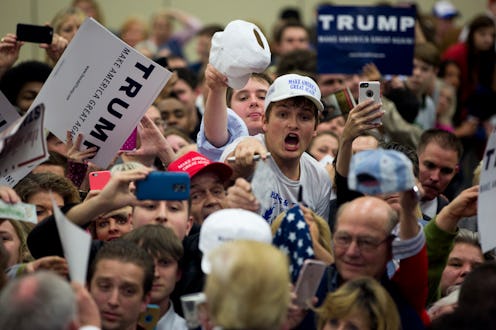News
Donald Trump Won An Unlikely Pair Of Primaries
The bizzaro world of the 2016 primary season has brought together two unlikely allies for the first time in two decades: Alabama and Massachusetts. According to The Washington Post reporter Dave Weigel, Donald Trump has accomplished the unusual and rallied voters from the Deep South and the Northeast. If it sounds odd, it's because it is odd — the last Republican candidate to accomplish this feat was Bob Dole during the 1996 primary.
That year's primary actually has some stunning similarities to the current contest. The field stayed remarkably crowded through Super Tuesday, and Steven Forbes, also from New York, acted as the Donald Trump of two decades ago in terms of his business background. However, Forbes dropped out of the race just following Super Tuesday, while it looks like Trump will be marching on to the later primaries, especially in light of his strong performance Tuesday night.
Trump's significant Super Tuesday victory certainly erases any doubt that he is the frontrunner of the race. However, he did diverge from Bob Dole's trajectory, when he swept all nine Super Tuesday states — Ted Cruz beat Trump in his home state of Texas, therefore winning the bulk of its 155 delegates, as well as Oklahoma and at least seven of its 47 total delegates. Yet Trump's widespread appeal means that he will still end up with the most delegates at the end of the night and probably, from a Republican stand point, should be the party nominee. It does seem that Trump as the nominee would give as to give the GOP the best chance of reaching the White House. After all, the monumental occasion of winning both the Alabama and the Massachusetts primary probably shouldn't be ignored by party leaders.
Trump's ability to bring together the two very ideologically distinct states is admittedly impressive, but don't worry too much about the general election — Massachusetts hasn't voted Republican since 1984 and seems unlikely to do so this year, considering there are three times as many registered Democrats as registered Republicans. However, Trump's historic accomplishment does illustrate his universal appeal to conservatives, and certainly adds another indicator about his likelihood of being named the party nominee at the convention in July. Dole went on to be the party nominee versus incumbent Bill Clinton, so there is precedent to the theory. Perhaps history will repeat itself and the other Clinton will defeat the Alabama-Massachusetts candidate come November.
